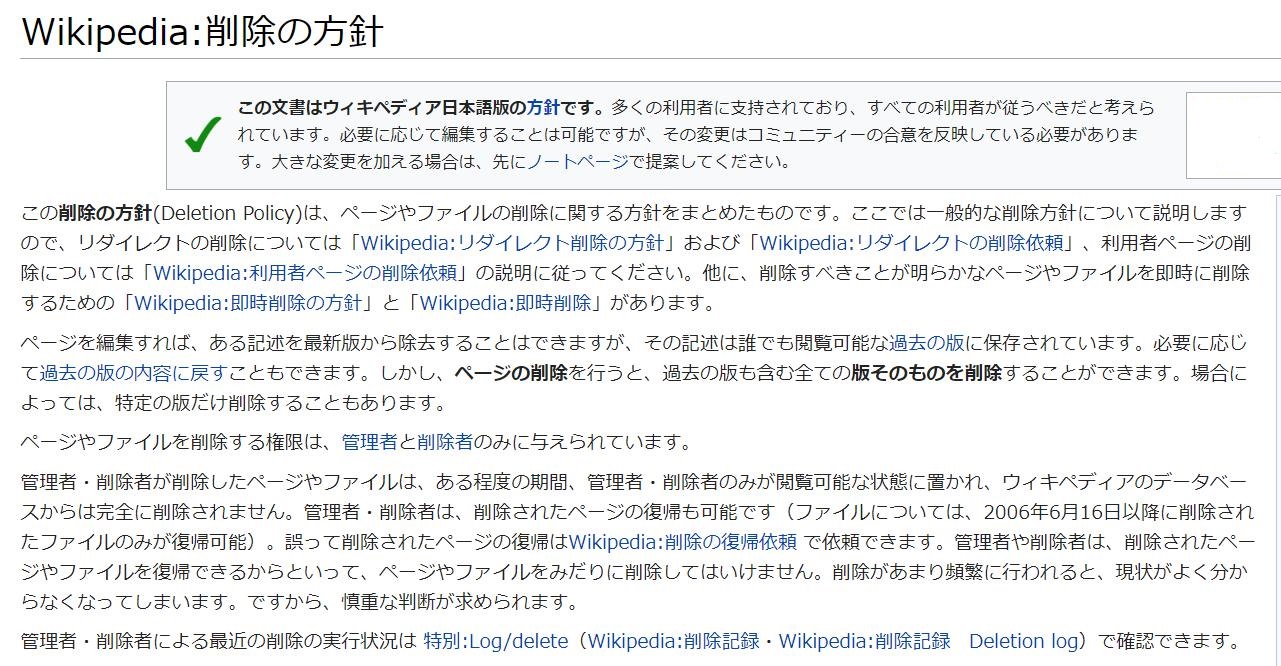Explaining the Procedure and Criteria for Deletion Requests on Wikipedia

There are many company representatives who are troubled by negative articles about their company being posted on Wikipedia, such as “an employee was arrested for molestation” or “despite receiving notifications of defective products, no action was taken for replacement, etc.”
In this article, we will explain examples of articles that can be deleted on Wikipedia, Wikipedia’s deletion policy, and how to request deletion.
What is Wikipedia?

Wikipedia is a free online encyclopedia.
When you search for a person’s name or a company’s name, you can find detailed information such as their biography. By downloading the free Wikipedia app on your smartphone, you can read Wikipedia articles on your device.
Furthermore, anyone can write new articles or edit existing ones.
Therefore, there is a risk that users who are considering starting a business transaction with your company might hesitate if they find negative articles about your company on Wikipedia when they search for your company’s name on search engines or apps.
Wikipedia’s Deletion Policy (ウィキペディアの削除方針)

Wikipedia has established a policy regarding the deletion of pages and files.
Based on this deletion policy, in order to delete a page or file, it is necessary to obtain consensus through deliberation in a deletion request.
Source: Wikipedia: Deletion Policy[ja]
Also, pages and files that clearly fall under the policy for immediate deletion become subject to immediate deletion. These pages and files are deleted by the sole discretion of administrators or deleters, without going through deliberation.
When administrators or deleters cannot make a decision on their own, it seems that the matter may be moved to a deliberation forum.
According to the deletion policy, if consensus is obtained through deliberation in a deletion request for the following reasons, administrators or deleters will carry out measures such as deletion based on the results of the deliberation.
Case A: Items that are subtly subject to immediate deletion
Excerpt from the Deletion Policy (as of December 19, 2019)
Case B: When there are legal issues
o Matters related to copyright
o Matters that infringe on privacy
o Matters that harm the honor of others, and may consequently be subject to crimes such as defamation, insult, and credit defamation
o Matters that may infringe on the interests of other companies
o Matters that may not be legal
Case C: When it hinders page movement
Case D: When there is a problem with the page name
Case E: Non-encyclopedic articles
Case F: When there is a request from the poster
Case G: When there are issues with other languages/translations
Case Z: When there are other issues
According to this deletion policy, articles such as “Employee A (real name) was arrested for molestation” can be considered for deletion request as a “non-encyclopedic article” under Case E, or as a “matter that infringes on privacy” under Case B.
Source: Wikipedia: Deletion Request[ja]
For more details on the requirements for infringement of privacy rights, please refer to this article.
Related Article: A thorough explanation of privacy rights. What are the three requirements for infringement?[ja]
Articles Subject to Deletion on Wikipedia

There are several types of articles that can be deleted on Wikipedia, including:
Articles that Violate the Law
Articles that infringe on copyrights, portrait rights, privacy, or defame someone’s reputation, and are in violation of the law, are subject to deletion.
However, because anyone can freely edit content on Wikipedia, an article will not be deleted simply because its content is incorrect. In order for an article to be deleted, it must not only contradict the facts, but also violate the law.
Articles that Do Not Fit the Encyclopedia Criteria
As Wikipedia is an online encyclopedia, articles that are not considered to be encyclopedic in content are subject to deletion.
Specifically, this includes articles without notability, unsupported original research presentations, and advertisements or spam.
Other Articles, such as Groundless Defamatory Articles or Articles that Cause Damage to Reputation
On Wikipedia, there are cases where posts that exceed the scope of a free encyclopedia, such as defamatory articles or articles that cause damage to the reputation of a person or company, are made.
Such posts are considered to be subject to deletion, similar to defamatory posts or posts that cause damage to reputation on anonymous bulletin boards like 5chan.
Reference Article: How to Request the Deletion of Posts on 5chan (formerly 2chan)[ja]
Examples of Articles That May Be Subject to Deletion

When you search for a company name on Wikipedia, you can check the company’s business content and history. Among them, there may be negative articles such as defamation posted.
Article stating “Employee A was arrested for molestation”
If an employee is arrested for molestation, the company’s image will inevitably be damaged.
An article stating that there is an employee who was arrested for molestation has the potential to negatively affect the management of the company.
For example, it is somewhat “inevitable” for a Wikipedia page about a company to post “scandals of the company itself”.
However, it may not be naturally acceptable for the fact of a mere employee’s arrest to be listed on “the encyclopedia page about the company”.
Wikipedia, a site that calls itself an “Internet Encyclopedia”, has a policy of deleting “non-encyclopedic articles”.
Therefore, there is a possibility that an article about an employee being arrested for molestation may be requested for deletion.
Article stating “Even after receiving a notification of defective products, no action such as replacement was taken”
This is an article stating “Even after receiving a notification of defective products, no action such as replacement was taken”.
Such articles, like the ones mentioned above, may be considered “non-encyclopedic articles”.
As a general argument apart from Wikipedia-specific discussions, such articles cannot naturally be deleted.
At the level of judgment as to “whether it can be said to be illegal for defamation”, it may be judged that a warning about troubles between a certain company and customers is necessary information for users and is in the public interest, so it does not constitute defamation.
At the level of “whether it constitutes defamation or not”, for example, if there was a misunderstanding between the poster and the company, and the company did not respond because the failure was due to the poster’s incorrect usage, the appropriateness of making such a statement on the Internet would be questioned.
However, even if it is not illegal, in relation to the rules voluntarily established by Wikipedia, it can be said that there is a possibility that it can be argued that “it is a violation and should be deleted”.
How to Delete an Article on Wikipedia

Requesting Article Deletion on Wikipedia
To request the deletion of an article on Wikipedia, follow these steps:
- Edit the article you want to delete
- Create a request subpage
- Post on “Wikipedia: Deletion Request”
- Voting and commenting by users
- Final decision by an administrator or deleter
Consult a Lawyer if Your Deletion Request is Not Accepted
We will explain how to handle situations where your deletion request is not accepted.
For Case B of the deletion policy, “When there are legal issues (such as damaging someone else’s reputation, potentially leading to defamation, insult, or credit defamation),” consider defamation (infringement of the right to reputation).
The requirements for defamation are as follows:
- Publicly
- Pointing out facts
- Defaming someone’s reputation
In the example given above, if it is written, “Even after being notified of defective products, no action was taken for replacement, etc.,” then:
- The statement, “Even after being notified of defective products, no action was taken for replacement, etc.,” has a specific meaning,
- Handling returns and exchanges of defective products is subject to certain legal regulations, and being perceived as a company that does not take such actions is disadvantageous for the company,
- The company claims that it is properly handling returns and exchanges of defective products.
However, even if the requirements for defamation are met, defamation does not occur if the following conditions are met. Please be aware of this.
- There is public nature
- There is public interest
- It is true or truthfulness is recognized
It is not easy to determine whether or not it constitutes defamation, so if you are unsure, please consult a lawyer who handles many defamation-related cases.
For more details on the requirements for defamation, please refer to the article below.
Identifying Contributors to Wikipedia

If there are numerous instances of baseless defamatory articles or articles causing reputational damage being posted repeatedly, you can request a lawyer to make a disclosure request for sender information.
A disclosure request for sender information is a procedure based on Article 4, Paragraph 1 of the Japanese Provider Liability Limitation Act.
Through this procedure, you can request the disclosure of information such as the IP address, name, and address of the poster of defamatory or reputation-damaging articles.
Since Wikipedia is a site/app that anyone can edit freely for free, there may be cases where people who hold a grudge against a company or individual post baseless rumors or defamation. In such cases, if the sender’s information such as the poster’s IP address is known, it is possible to identify the poster.
The procedure for identifying the sender is as follows:
- Request information disclosure about the poster’s IP address to the content/service provider (Wikipedia)
- Apply for a provisional disposition for the disclosure of sender information related to the poster’s IP address
- Identify the transit provider (for example, Docomo or Nifty)
- Apply for a provisional disposition prohibiting the deletion of sender information to the transit provider or make a request outside of court
- File a lawsuit for a disclosure request for sender information
- The sender’s information (address and name) is disclosed based on the court’s judgment
The above is a general theory that can be said to be common to each site, not limited to Wikipedia, but there is one important feature in the case of Wikipedia.
Wikipedia is a site where you can post or edit articles whether you register as a user or not. Even if no user registration has been made, the IP address of the person who posted or edited the article is displayed in the change history screen within the “history display” of each article.
Quote: Wikipedia change history [ja]
In the above case, the editing action on January 30, 2020, was performed by a registered user, and only the user ID (the part hidden by the mosaic) is displayed for that user. However, the editing action at 16:49 on January 26 was performed by an unregistered user, and that user’s IP address (220.221.*.*) is displayed.
In other words, in the above procedure, the parts 1-2, “Make Wikipedia disclose the poster’s IP address,” are unnecessary, and you can proceed with identifying the poster with the poster’s IP address known from the beginning.
If the poster is revealed through the above procedure, you can claim damages from the poster for the attorney’s fees and consolation money required to identify the poster.
For more detailed explanation on how to identify contributors to Wikipedia, please refer to the following article.
Reference article: How to Identify Contributors to Wikipedia and the Average Cost of Legal Fees[ja]
Summary: Manage Reputational Damage by Requesting Deletion on Wikipedia

Wikipedia is a convenient encyclopedia site and app, but it can sometimes contain defamatory or damaging articles based on misunderstandings or malice. You can request the deletion of such articles. However, if your deletion request is not granted, there may be cases where you need to request deletion through a court or identify the poster.
If you want to request deletion through a court or identify the poster to claim damages, we recommend consulting with a lawyer.
Introduction to Our Firm’s Measures
Monolith Law Office is a legal office with high expertise in both IT, particularly the internet, and law. In recent years, reputational damage and defamation spread on the internet have caused serious harm to companies. As specialists in both IT and law, our firm is capable of understanding the position of companies and providing support for reputational damage control. Details are provided below.
Areas of practice at Monolith Law Office: Reputational damage control for listed companies and others[ja]
Category: Internet
























